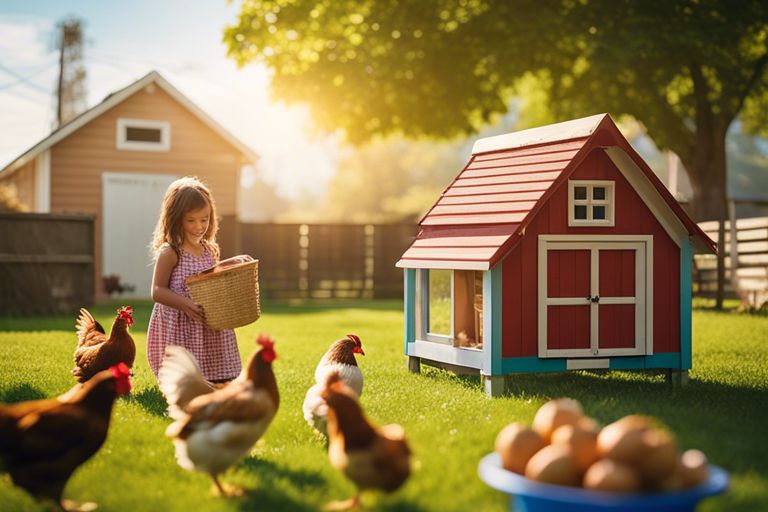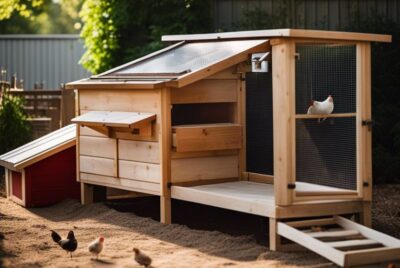Chickens and Kids – Teaching Children Responsible Coop Care
Overseeing the care of a chicken coop can be a fun and educational experience for children of all ages. By involving kids in the care of chickens, they can learn responsibility, compassion, and valuable life skills. Teaching children how to properly care for chickens can also create a strong bond between the kids and their feathered friends. This informative blog post will provide tips and guidance on how to effectively teach children responsible coop care, ensuring the well-being of both the chickens and the young caregivers.
Setting the Scene for Responsibility
For children, learning how to care for chickens can be a fulfilling and educational experience. It teaches them responsibility, compassion, and the importance of hard work. However, before stepping into the world of coop care, it’s essential to set the scene for responsibility.
By creating a structured environment and setting clear expectations, children can learn the value of taking care of living creatures and understand the crucial role they play in their chickens’ well-being. This chapter will explore age-appropriate coop chores and how to establish a routine that fosters a sense of responsibility in children.
Age-Appropriate Coop Chores
One of the first steps in teaching children responsible coop care is assigning age-appropriate chores. Younger children can help with simple tasks like refilling water and scattering feed, while older children can take on more challenging responsibilities such as collecting eggs, cleaning the coop, and checking for signs of illness. By assigning tasks that match their age and capabilities, children can feel a sense of accomplishment and pride in caring for their chickens.
It’s essential to supervise children while they are caring for the chickens and provide guidance when needed. By teaching them proper techniques and explaining the importance of each task, children can develop a deep understanding of the responsibilities that come with owning chickens.
Establishing a Routine
On top of assigning age-appropriate chores, establishing a routine is key to teaching children responsibility in coop care. Consistency is crucial in ensuring that tasks are completed on time and that the chickens receive the care they need every day. By creating a schedule for feeding, cleaning, and checking on the chickens, children can learn the importance of regular care and develop a sense of accountability for their actions.
It is important to set clear expectations and consequences for not following the established routine. By holding children accountable for their responsibilities, they will learn the importance of consistency and commitment in caring for their chickens.
Health and Safety in Coop Care
One of the most important aspects of caring for chickens is ensuring their health and safety. Just like any other pet or animal, chickens require regular attention and care to prevent illnesses and ensure their well-being.
Identifying and Preventing Common Chicken Ailments
Identifying common chicken ailments early is crucial in preventing the spread of diseases among your flock. Keep an eye out for symptoms such as abnormal behavior, changes in appetite, difficulty breathing, or unusual discharge. Common ailments in chickens include respiratory infections, mites, and bumblefoot. By monitoring your chickens regularly and seeking veterinary care when needed, you can help prevent these ailments from becoming serious problems for your flock.
Safety Precautions for Kids and Chickens
Any child involved in caring for chickens should be taught basic safety precautions to ensure both their well-being and that of the birds. Teach children to handle chickens gently and to wash their hands thoroughly after handling them. Supervise children when they are feeding or collecting eggs to prevent any accidents. Additionally, ensure that the coop is secure to prevent predators from harming the chickens and to keep the children safe.
Children should also be educated on the potential dangers of certain chicken ailments. Teach them how to identify symptoms of common chicken illnesses and emphasize the importance of alerting an adult if they notice any signs of sickness in the flock. By teaching children how to care for chickens responsibly and safely, you are instilling valuable life skills while promoting the health and well-being of the birds.
Educational Aspects of Coop Care
Now that children are involved in caring for chickens, there are valuable educational aspects that come into play. Beyond just the practical responsibilities of coop care, children can learn important life lessons through this hands-on experience.
Lessons in Empathy and Compassion
Compassion is a key lesson that children can learn through caring for chickens. By understanding the needs of their feathered friends, kids develop empathy towards living creatures. Feeding, watering, and ensuring the chickens’ living space is clean and safe teaches children to be attentive and caring towards animals.
Through daily interactions with chickens, children also learn about the importance of nurturing and developing relationships. Chickens exhibit emotions and behaviors that can help kids recognize the value of compassion and connection with other living beings.
Science and Nature Insights
For children, caring for chickens provides a unique opportunity to research into the world of science and nature. Kids can observe firsthand the life cycle of chickens, from egg to hatchling to fully-grown hen. This hands-on experience allows children to learn about biology, reproduction, and animal behavior.
Aspects of the natural world, such as the role of sunlight in egg production or the behavior of hens during different seasons, can be observed and studied by children caring for chickens. These insights not only deepen their understanding of the natural world but also foster a sense of stewardship towards the environment.
Family Involvement and Bonding
After setting up the chicken coop and introducing your children to the basics of chicken care, it’s time to focus on family involvement and bonding. Taking care of chickens can be a wonderful way for the whole family to spend quality time together and learn valuable lessons about responsibility and teamwork.
Creating a Family Coop Care Plan
To ensure that everyone in the family is involved in caring for the chickens, consider creating a family coop care plan. Sit down together and decide on specific tasks that each family member can be responsible for, such as feeding the chickens, collecting eggs, cleaning the coop, and checking for signs of illness. By assigning duties and creating a schedule, everyone will know their role and can work together efficiently to care for the chickens.
Having a family coop care plan not only helps distribute the workload but also teaches children the importance of consistency and commitment when it comes to taking care of animals. Encourage open communication and regular check-ins to assess how the plan is working and make any necessary adjustments to ensure that everyone is contributing to the care of the chickens.
Fun Coop Care Activities for the Whole Family
To make caring for the chickens an enjoyable experience for the whole family, incorporate fun activities into your routine. Consider organizing a weekly “chicken checkup” where everyone gathers to inspect the chickens, check their health, and interact with them. You can also involve children in gathering supplies for the coop, planting chicken-friendly herbs or vegetables in the coop area, or building enrichment activities for the chickens to enjoy.
Caring for chickens can be a rewarding and educational experience for children, and involving the whole family can further strengthen bonds and create lasting memories. By combining responsibility with fun activities, you can instill important values in your children while creating a positive and engaging environment for both the chickens and your family.
Final Words
Taking this into account, educating children about responsible coop care for chickens is an important and beneficial endeavor. By teaching kids the value of caring for animals, they learn crucial life skills such as empathy, responsibility, and compassion. Additionally, involving children in chicken care can foster a sense of pride and accomplishment as they contribute to the well-being of the animals. Through hands-on experiences and gentle guidance, children can develop a deeper understanding and appreciation for the needs of our feathered friends. Encouraging a love for animals and nature at a young age sets the foundation for a lifetime of respect and care for the world around us. So, let’s continue to empower our children to become responsible and caring stewards of their chicken coops and beyond.



